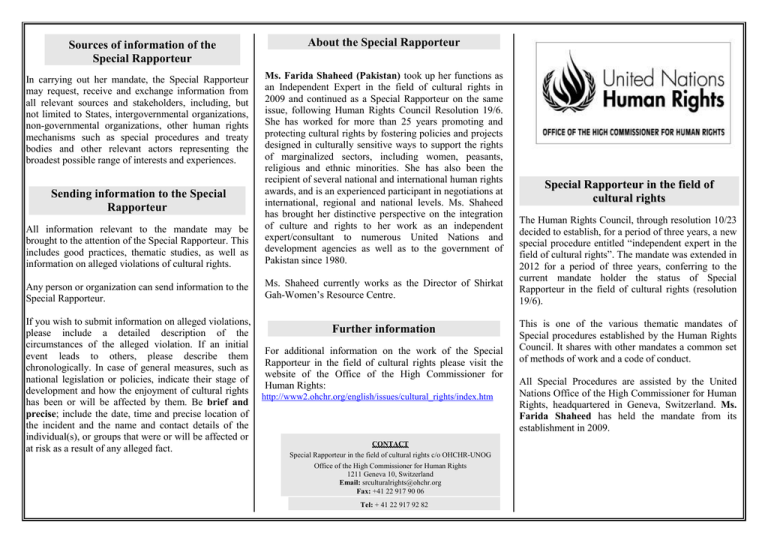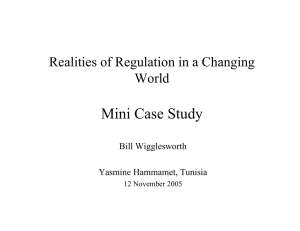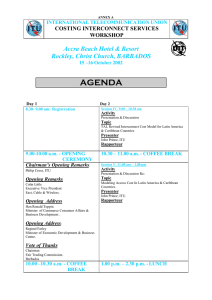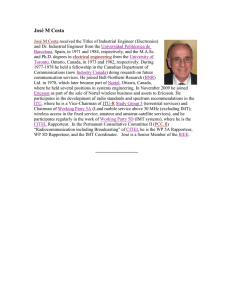S p e c
advertisement

Sources of information of the Special Rapporteur About the Special Rapporteur All information relevant to the mandate may be brought to the attention of the Special Rapporteur. This includes good practices, thematic studies, as well as information on alleged violations of cultural rights. Ms. Farida Shaheed (Pakistan) took up her functions as an Independent Expert in the field of cultural rights in 2009 and continued as a Special Rapporteur on the same issue, following Human Rights Council Resolution 19/6. She has worked for more than 25 years promoting and protecting cultural rights by fostering policies and projects designed in culturally sensitive ways to support the rights of marginalized sectors, including women, peasants, religious and ethnic minorities. She has also been the recipient of several national and international human rights awards, and is an experienced participant in negotiations at international, regional and national levels. Ms. Shaheed has brought her distinctive perspective on the integration of culture and rights to her work as an independent expert/consultant to numerous United Nations and development agencies as well as to the government of Pakistan since 1980. Any person or organization can send information to the Special Rapporteur. Ms. Shaheed currently works as the Director of Shirkat Gah-Women’s Resource Centre. In carrying out her mandate, the Special Rapporteur may request, receive and exchange information from all relevant sources and stakeholders, including, but not limited to States, intergovernmental organizations, non-governmental organizations, other human rights mechanisms such as special procedures and treaty bodies and other relevant actors representing the broadest possible range of interests and experiences. Sending information to the Special Rapporteur If you wish to submit information on alleged violations, please include a detailed description of the circumstances of the alleged violation. If an initial event leads to others, please describe them chronologically. In case of general measures, such as national legislation or policies, indicate their stage of development and how the enjoyment of cultural rights has been or will be affected by them. Be brief and precise; include the date, time and precise location of the incident and the name and contact details of the individual(s), or groups that were or will be affected or at risk as a result of any alleged fact. Further information For additional information on the work of the Special Rapporteur in the field of cultural rights please visit the website of the Office of the High Commissioner for Human Rights: http://www2.ohchr.org/english/issues/cultural_rights/index.htm CONTACT Special Rapporteur in the field of cultural rights c/o OHCHR-UNOG Office of the High Commissioner for Human Rights 1211 Geneva 10, Switzerland Email: srculturalrights@ohchr.org Fax: +41 22 917 90 06 Tel: + 41 22 917 92 82 Special Rapporteur in the field of cultural rights The Human Rights Council, through resolution 10/23 decided to establish, for a period of three years, a new special procedure entitled “independent expert in the field of cultural rights”. The mandate was extended in 2012 for a period of three years, conferring to the current mandate holder the status of Special Rapporteur in the field of cultural rights (resolution 19/6). This is one of the various thematic mandates of Special procedures established by the Human Rights Council. It shares with other mandates a common set of methods of work and a code of conduct. All Special Procedures are assisted by the United Nations Office of the High Commissioner for Human Rights, headquartered in Geneva, Switzerland. Ms. Farida Shaheed has held the mandate from its establishment in 2009. Functions Activities Issues in Focus Pursuant to Human Rights Council Resolution 19/6, the Special Rapporteur in the field of cultural rights is mandated to carry out the following functions: Country visits: The Special Rapporteur conducts on average two official missions to countries per year. These are conducted upon the invitation of the Government concerned, and the Special Rapporteur reports to the Human Rights Council on her findings and recommendations. The main objective of the country visits is to engage proactively with States and other stakeholders so as to enhance the promotion and protection of cultural rights on the ground. In her first report to the Human Rights Council, the Special Rapporteur developed preliminary views on the conceptual and legal framework of her mandate. Focusing on the challenges regarding the scope and content of cultural rights, she reviewed the relevant existing provisions in United Nations human rights instruments, and developed her initial thoughts on the interaction among the principle of universality of human rights, the recognition and implementation of cultural rights and the need to respect cultural diversity. The Special Rapporteur also selected a list of priority issues she proposed to address. To identify best practices in the promotion and protection of cultural rights at the local, national, regional and international levels. To identify possible obstacles to the promotion and protection of cultural rights, and to submit proposals and/or recommendations to the Human Rights Council on possible actions in that regard To work in cooperation with States in order to foster the adoption of measures at the local, national, regional and international levels aimed at the promotion and protection of cultural rights through concrete proposals enhancing sub regional, regional and international cooperation in that regard To study the relationship between cultural rights and cultural diversity, in close collaboration with States and other relevant actors, including in particular the United Nations Educational, Scientific and Cultural Organization, with the aim of further promoting cultural rights To integrate a gender perspective into her work and disabilities To work in close coordination, while avoiding unnecessary duplication, with intergovernmental and non-governmental organizations, other special procedures of the Council and the Committee on Economic, Social and Cultural rights and UNESCO, as well as other actors representing the broadest possible range of interest and experiences, within their respective mandates, including by attention and following up on relevant international conferences and events. Thematic research: The Special Rapporteur presents annual thematic reports to the Human Rights Council and the General Assembly on issues related to her mandate. Communications: The Special Rapporteur receives information submitted from all stakeholders. Information received is used in several activities undertaken by the mandate. Where appropriate, the Special Rapporteur may exchange communications with the concerned governments. Other activities: The Special Rapporteur participates in conferences, seminars, and other events that are relevant to her mandate. Thereafter, the Special Rapporteur focused on the following issues: The right of access to and enjoyment of cultural heritage (2011) The right to enjoy the benefits of scientific progress and its applications (2012) Cultural rights of women on an equal basis with men (2012) The right to freedom of artistic expression and creativity (2013) The writing and teaching of history – history textbooks (2013) The Special Rapporteur stresses that her mandate is not to protect culture and cultural heritage per se, but the conditions allowing all people without discrimination to access, participate and contribute to cultural life in a continuously developing manner.



